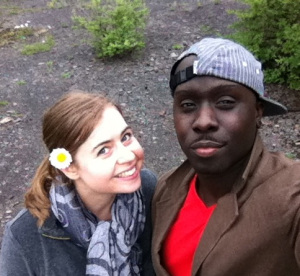All Kinds of Diabetes
 “What in the world is ‘pre-diabetes?”A few days ago, the doctor reported that my husband is at risk of developing type 2 diabetes.
“What in the world is ‘pre-diabetes?”A few days ago, the doctor reported that my husband is at risk of developing type 2 diabetes.
The news hits me hard. I’ve spent most of my life struggling with type 1 diabetes. And while I think I’ve gotten reasonably good at it, I don’t want my husband to have to deal with these kinds of challenges. I worry that he won’t take care of himself and that it will cause other health complications.
“Why is the pancreas so incompetent?” I fume. Converting food into energy is a pretty important job, and yet this organ seems to fail on us frequently: Type 1, type 2, gestational, and pre-diabetes are all over the place.
I sit with my husband, holding his hand and thinking about how the pancreas can be so unreliable. I know the most about type 1 diabetes, since I have it. I know that it usually develops in children, and it happens when the pancreas stops producing insulin for good. Type 2 is what my husband may be developing. As I understand, this type generally emerges in adults. It happens when the pancreas is not able to produce a sufficient amount of insulin. My sister is now pregnant with her first child, and she is at high risk for gestational diabetes. I don’t’ know much about this type, but I think it occurs when the body is trying to produce enough insulin for both mother and child.
“I’m scared about you getting diabetes,” I tell my husband. I move closer, willing his body to be strong and resilient.
I’m apprehensive that he won’t take it seriously.
I’m anxious about his workout routines and eating habits.
I’m uneasy about how diabetes will affect his health.
I’m concerned about how this might affect our future children or grandchildren.
“I’ll be fine,” he reassures me.
But his nonchalant attitude makes me even more nervous. “But what can we do about it?” I sniff.
“Let’s look it up,” he suggests. We sit at the computer and begin typing searches into Google. I pull nutritional-health and home-remedy books off the shelf.
Our research recommends:
Get regular aerobic and anaerobic exercise.
Eat more whole grains and vegetables.
Sleep more.
Incorporate cinnamon, vinegar,and coffee into the diet.
“This is great advice for anyone!” I exclaim, gaining confidence. “Good old diabetes, keeping us healthy.”
“So what’s next?” With our new found information, we are ready to make a plan of action. First, we consider ways that my husband can fit more cardio exercise into his weekly schedule. Then we brainstorm vegetables that he likes and put them in favorite-to-least-favorite order. I make a mental note to pick up broccoli and cauliflower at Trader Joe’s tomorrow. We talk about how to make sure low carb foods are more available for meals and late-night snacks. As a tenacious business owner, he is most resistant to sleeping more. After some deliberation though, I’m at least consoled that he will keep it in mind as an important component of his health.
“Thanks for talking this through with me,” I tell my husband. “I love you so much, and I want you to get old with me.”
I make rice, salad, sausages, and collard greens for lunch. Then we blend frozen bananas with coconut milk and call it ‘ice cream,’ even though it’s kind of runny. He runs to the gym before dinner. I’m hopeful that all of this will help him to avoid developing diabetes. But even if it doesn’t, I know that we’ll continue supporting each other in resolving challenges. We’re like that now, and we’ll be that way when we get old together too.
Please share!
I’d love to hear your thoughts and experiences! What types of diabetes are you familiar with? Who in your life has been diagnosed and with what type? How do they stay positive about maintaining their health with diabetes?
Please write a comment below.
